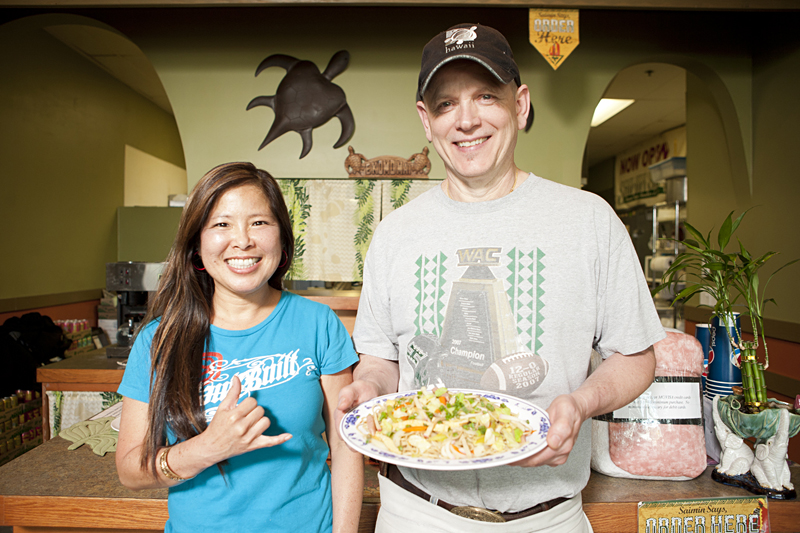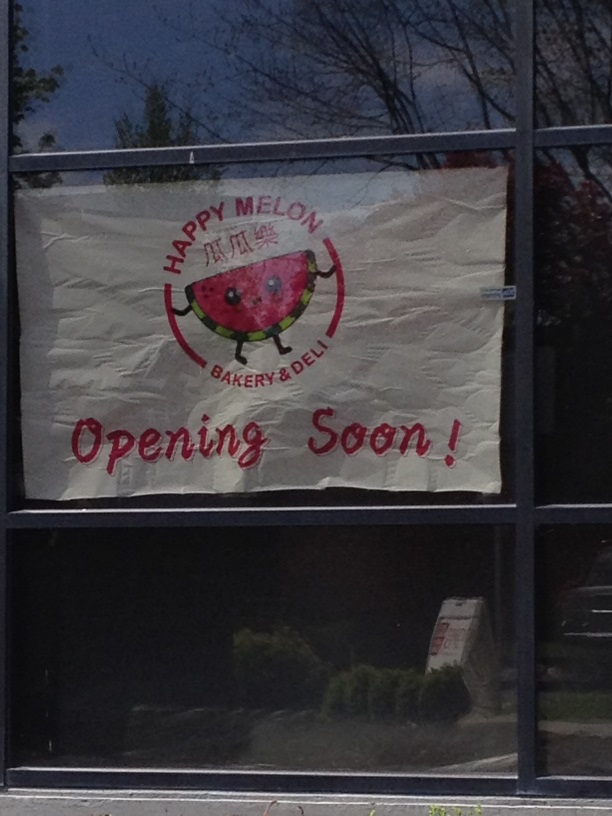When you really, really love a restaurant, how do you express your feelings? You might post an exclamation point–laden ode on Yelp, or ask the restaurant’s chef to cater your wedding. Or, if the object of your ardor is Saimin Says, a Hawaiian plate-lunch storefront named for the islands’ indigenous noodle soup, you could give the owners a Spam musubi pillow roughly the size of a cowboy-boot box.
The banded pink-and-white cushion, which a culinary historian might slip beneath his haunches while meditating on the breathtaking adaptations and accommodations that define Pacific Island cookery, now leans against the restaurant’s cash register. A note directing patrons to use cash or debit cards for purchases under $10 is package-taped to its midsection.
The goofy pillow is a lonely remnant of the Polynesian bric-a-brac that adorned Saimin Says’ previous location in Des Moines, much of it gifted to Colleen Shoda and Ted Keene by customers grateful for their precise renditions of dishes that aren’t anything special 2,700 miles southwest of Seattle. While very little of the collected decor has shown up in the newish Kent strip-mall unit that in 2010 became Saimin Says’ sole address (following a short spell in which the restaurant ran two locations), the devoted fans acquired over 18 years of frying rice and flipping omelets have made regular appearances—along with a crew of intrigued eaters from nearby office buildings.
“This location has brought us a whole new clientele,” Shoda says. “Whereas up there it was 90 percent Pacific Islander, down here it’s 50-50.”
It’s hard to conceive of a better primer on modern Hawaiian foodways than Saimin Says. Granted, any restaurant working in the Hawaiian idiom has a significant head start in the likability race, since the island’s collective recipe box is crammed with dishes devised to comfort communities far from home. Hawaii’s plantations attracted Chinese sugar-cane cutters, who preferred rice to poi; Korean millworkers, who concocted sweet garlic sauces; and Japanese pineapple pickers, who planted soybeans and simmered noodle soups. The laborers’ nostalgia added up to a cuisine that—much like Tex-Mex, its landlocked equivalent—is meaty, salty, and sloppy. Only a prude could resist it.
But Saimin Says doesn’t merely pander to cravings, it validates them. With tender, smoke-laced kalua pig; a mushroomy saimin broth that lollygags on the tongue; and a terrific mayo-drenched mac salad knitted with tuna, the restaurant assures skeptics that it’s perfectly OK to admire a culinary tradition that exalts teenage boys (the legendary inventors of loco moco) and canned meat.
“I remember going to Albertsons and ordering a dozen cans of Spam; I’d feel so awkward,” Shoda says of the restaurant’s early years. “Now I go to Costco and fill up a flat.”
Shoda was working at a Maui hotel when she realized there were no banks or relatives stopping her from leaving Hawaii and opening a cafe on the mainland. She initially planned to open a coffee shop—still a fairly novel concept back in 1994—but learned three others were slated to open within a block of the Las Vegas venue she’d chosen. So she switched to a saimin concept and took it to Seattle, where she’d heard the winters were mild. She was accompanied by Keene, an Idaho native who’d mastered Hawaiian cooking during his island stay.
“You know you’ve got something when the fried rice is better than your mom’s,” Shoda says.
The pair married the following year. They’ve since separated, but remain business partners (agreeable ones, according to Shoda). Although Saimin Says developed a loyal customer base in Des Moines’ Midway neighborhood, business faltered after the grocery store which had anchored its strip mall shut down, prompting the addition of the Kent location. The restaurant permanently moved out of Midway when a nightclub took over an adjacent space.
Other than the musubi pillow, a few Gauguin prints, and a wooden outrigger model perched atop the drinks cooler, there’s nothing distinctively Hawaiian about the current restaurant’s appearance. Yet Saimin Says’ on-point flavors are more effective than surfboards and a Don Ho soundtrack at inducing an island reverie.
Saimin Says uses fresh ingredients, except when the restaurant’s allegiance to what Shoda calls “true blue” Hawaiian cooking demands otherwise. Keene doesn’t meticulously recreate Spam, nor does he try to best the chantilly and coconut-pudding cakes produced by Seattle’s estimable Cakes of Paradise. He imports Portuguese sausage, Hawaiian hot dogs, and the sturdy, kinky wheat noodles which nest in the restaurant’s saimin bowls, as neat and colorful as winning Trivial Pursuit playing pieces.
The saimin broth is lip-swellingly salty, and grows more so as matchsticks of Spam, scrawls of darkly roasted pork, and strips of fish cake wallow in it. The Papa Jim Min, perhaps the best saimin on a list of a dozen different preparations, scores texture points with creamy patches of scrambled egg and a flurry of crisp green onions. The soup needs nothing, but Keene makes a dazzling, sunshiny hot sauce that would be silly to ignore.
Unless you order the veggie saimin, the green onions are likely to be the only plant life you’ll encounter at Saimin Says, a staunchly carnivorous operation. (Vegetarians who aren’t in the mood for saimin can choose among a vegetable omelet, French toast, and pancakes. The remaining 42 main dishes on the menu involve meat.) This isn’t an issue, because you can have a salad for lunch tomorrow, and because the pork, beef, and chicken dishes are uniformly excellent.
The greaseless, rich brown gravy—which blankets the mounded moco plates of rice, meat, and egg—is extraordinarily smooth and aromatic, and thick enough to eat with a fork. The satisfyingly sweet chili, styled after the chili served at Zippy’s, a popular Hawaiian chain (not associated with Zippy’s Giant Burgers in White Center), is chockablock with pinto beans. But for unmediated beef, the Island Beef is the savvy pick.
Anywhere else, this beef would be labeled as teriyaki. But the owner of the teriyaki shop next door wanted to maintain his immediate monopoly on the genre, so Saimin Says renamed its thinly sliced grilled beef. Whatever it’s called, the tender beef brims with brown sugar, soy sauce, and garlic in such impeccable proportion that when I nicked a sample from a takeout box, it immediately occurred to me that if I quickly polished off the entire plate, none of the people I’d promised to feed would ever know I’d ordered it.
Disappointments are rare at Saimin Says. Sweet-and-sour pork was burdened with too much cornstarch and pineapple juice, but redemption came via the outstanding kalua pig and shredded cabbage, so enchantingly smoky that it suggested discussions of national pork pre-eminence should stray beyond the South. Other dishes glanced the high bar it set, including phenomenally juicy chicken thighs, marinated in soy sauce until their skin shined; fluffy fried rice studded with bacon and two kinds of sausage; and the prim blocks of Spam musubi.
Whether or not you’re a fan of Spam, Saimin Says’ canned-meat pride exemplifies the restaurant’s welcome simplicity and sincerity. Asked what accounts for Saimin Says’ success, Shoda pauses only briefly: “Freshness and variation,” she says. “And Spam.”
PRICE GUIDE
Papa Jim min $8.15
Kalua Pig $8.65
Island beef $9.15
Loco moco $8.55
Mac salad $1.95
Spam musubi $1.75








